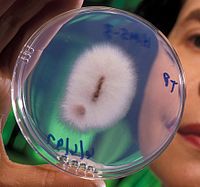
Photo from wikipedia
Abstract Activation of the phenylpropanoids pathway in date palm (Phoenix dactylifera L.) roots is a key defense mechanism against Fusarium oxysporum f. sp. albedinis (Foa), the causal agent of bayoud.… Click to show full abstract
Abstract Activation of the phenylpropanoids pathway in date palm (Phoenix dactylifera L.) roots is a key defense mechanism against Fusarium oxysporum f. sp. albedinis (Foa), the causal agent of bayoud. In this study, the effects of four hydroxycinnamic acids (0-5 µm/ml), mainly caffeic acid, p-coumaric acid, ferulic acid and sinapic acid, on fungal biomass production, sporulation and hydrolytic enzymes (protease, cellulase, polygalacturonase and pectinemethyl-esterase) of Foa were investigated. In vitro tests results showed an overall inhibition effect of caffeic and p-coumaric acids compared to ferulic and sinapic acids. Caffeic and p-coumaric acids at 5 µmol/ml had highest inhibition rates of mycelial growth and sporulation ranging from 73 to 80% and 97 to 100%, respectively. For hydrolytic enzyme activities, the inhibition rate of hydoxycinnamic acids tested for protease ranged from 80 to 100%, 63 to 98% for cellulase, 91 to 100% for pectinemethyl-esterase and 59 to 99% for polygalacturonase. Nevertheless, it was found that sinapic acid, at low concentration (0.5 µmol/ml), has no inhibition effect on mycelial growth and hydrolytic enzyme activities. Additionally, the half maximal inhibitory concentration (IC50) has also been determined to compare the different acids effects.
Journal Title: Archives of Phytopathology and Plant Protection
Year Published: 2021
Link to full text (if available)
Share on Social Media: Sign Up to like & get
recommendations!